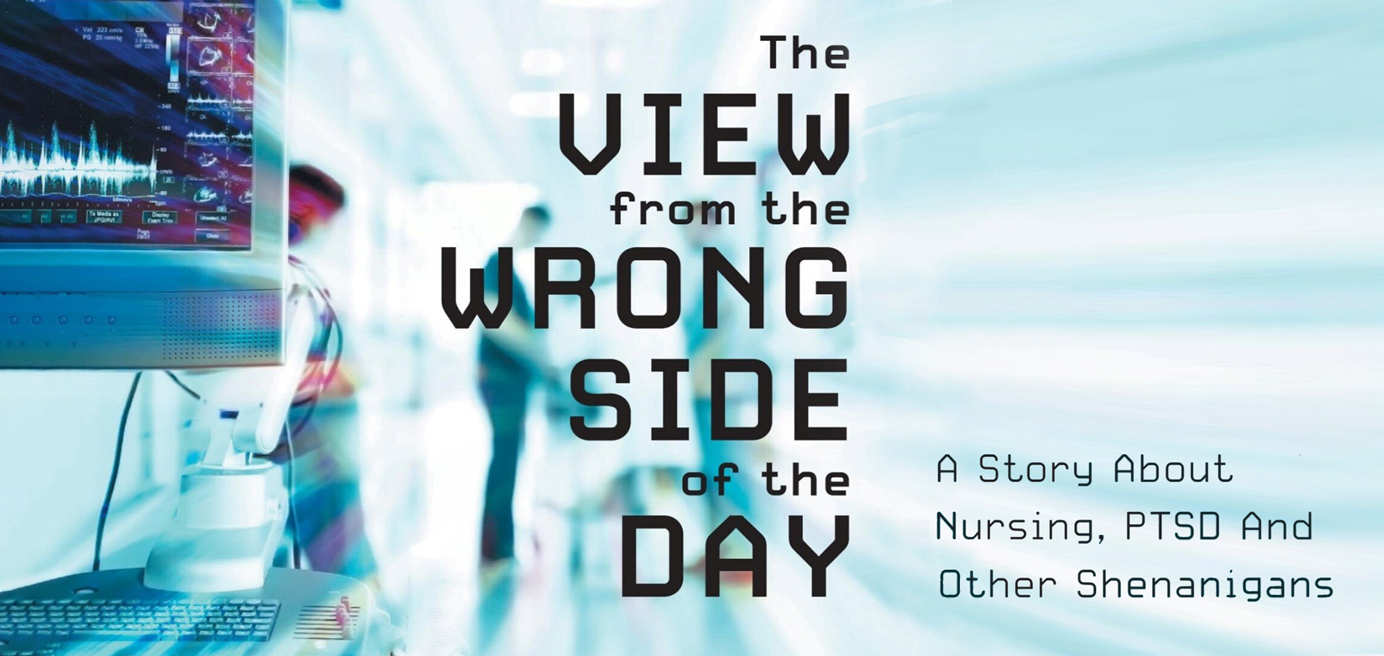 Frontline Danger
Frontline Danger

BC nurse's book is both a cautionary tale and prescription for action on mental injury
The View From the Wrong Side of the Day
T.C. Randall
Friesen Press, 2020
T.C. Randall has written a remarkable book. The first-time BC author, writing under a pseudonym, worked as an emergency room nurse for 14 years before being diagnosed with post-traumatic stress disorder two years ago. The View From the Wrong Side of the Day was published to further Randall's self-declared crusade to educate health-care workers about the dangers of emotional trauma in the workplace.
Randall is no longer employed as nurse. The book describes in detail the author's unsuccessful attempts to return to non-ER work after being diagnosed with PTSD, where they discover that working on the wards would still trigger the acute anxiety that drove them out of the work they loved, and where every Code Blue felt like "gunfire in the distance."
The writing process likely served a therapeutic purpose for Randall, but all readers will benefit from their story. The book is a brutally honest – and often humorous – first-hand account of Randall's journey. It begins with their decision to enter nursing as a second career and experiences as a nursing student. It then moves on to an account of the author's relationship with the profession and the process of self-discovery that led them to the emergency room.
ER nurses will appreciate Randall's description of the unique challenges and rewards of this stressful work. Nurses working outside the ER will gain fresh insights into delivering care in an ER from a colleague who also happens to be a very talented writer.
The author goes to great lengths to conceal their exact geographic location and health employer, and uses made-up acronyms for the names of the agencies they dealt with during their career. But any nurse in BC who reads the book would almost immediately know where, when and with whom Randall worked.
The book is also a cautionary tale. Anyone considering a career in nursing – especially ER nursing – should read this book first. Randall cites the metaphor of the frog that dies in a pot of slowly heated water to describe how nurses are affected by mental injury. There is a normalization of stress before the breaking point is reached – a breaking point that, despite the warning signs, is often difficult to avoid because of a nurse's obligations to their patients and co-workers – but when it comes it is often sudden and totally debilitating.
This book is a must read for all frontline health-care workers. It will also speak to anyone working in any high-risk profession or who has a family member working in one. The serious subject matter is leavened by Randall's accessible prose and mordant humour. Despite their injury and diagnosis, Randall remains a nurse with an opinion and an engaged attitude. The telling of their own story serves as an ideal vehicle to demystify and deromanticize the provision of acute care, critique health-care management and explain nurses' relationship to other health-care workers (as well as ER nurses' relationship to other nurses).
An entire chapter is devoted to a detailed account of Randall's efforts to receive workers' compensation, and the tortuous process they faced when attempting to file a claim in the wake of a breakdown that sent them off the job and into the grip of depression.
It's no secret that the workers' compensation system in BC needs serious improvement – BCNU and other unions welcomed and participated in the 2019 Patterson Review. Its recommendations to the provincial government promise to bring much-needed reforms that could see injured workers treated with respect and compassion – but Randall's first-hand description of the fear, frustration and self-doubt so many mentally injured workers experience underscores the urgency of the issue.
Randall made their claim before the provincial government passed legislation in April 2019 and enacted changes to the Workers Compensation Act which add nursing to the list of occupations that have the presumption of mental injury when filing for supports and benefits. The changes came after BCNU successfully pushed to include nurses in the legislation that gives first responders easier access to workers' compensation after experiencing traumatic events. It was a significant victory for the union and nurses across BC. With hope, it should mean nurses will no longer experience what Randall did.
The book is a passionate appeal for a profound shift in the way we all regard and treat workplace stress and mental injury and illness. Randall's is one more in the growing chorus of voices calling for mental health safety to be given the same level of consideration as physical safety. Otherwise, they argue, nothing will change.
Randall's own experience with mental injury and years on the ER frontline means they have no shortage of ideas for moving us the right direction. These include providing mandatory debriefing sessions after every critical incident, expanding staff education on appropriate stress management and rotating nurses out of critical care areas using job sharing programs with nurses in other sectors.
On the book's release in April, the author reported that they were already working on a second book. If writing is indeed Randall's chosen post-nursing career, they have made an excellent choice.
The View From the Wrong Side of the Day can be ordered through Friesen Press. •
UPDATE (Summer 2020)

